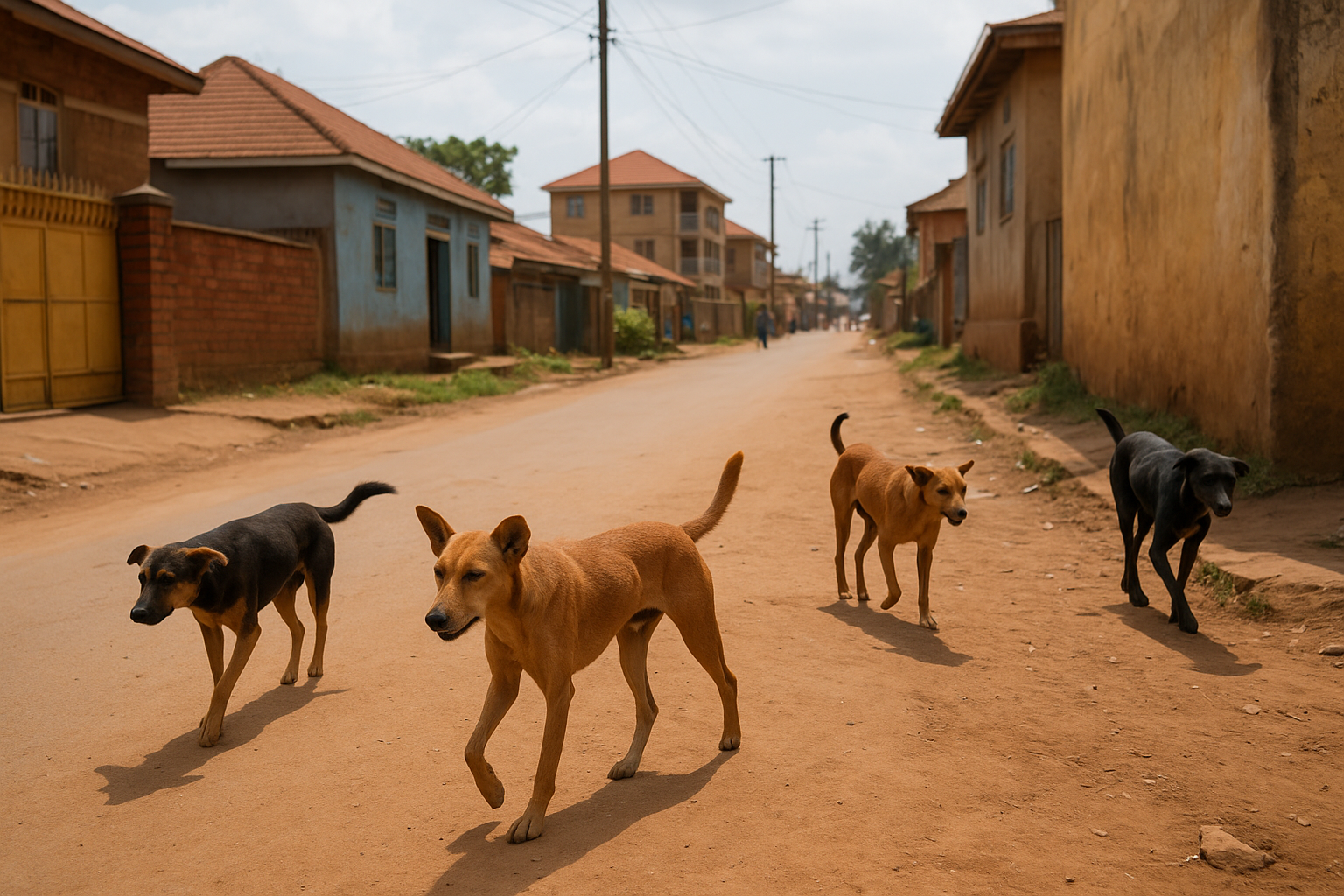
A Familiar but Heartbreaking Sight Across Kampala
If you’ve ever taken an early morning walk through Makindye, Rubaga, or Nsambya, you’ve probably seen them — tired, dusty dogs wandering the streets, sniffing roadside garbage, or sleeping in front of shops. In busy areas like Kibuye, Nateete, Ntinda, and Kawempe, they dart between taxis and boda bodas, searching for scraps or a kind stranger who might toss them a piece of chapati. Out in Buziga, Lubowa, and Seguku, they roam in small groups near unfinished houses or open compounds, often thin, limping, or frightened.
For many Kampala residents, this has become such a common sight that it hardly raises concern anymore. Yet, behind those wagging tails and sad eyes lies a silent crisis — one that affects our communities, our pets, and our safety. These are our city’s free-roaming dogs — a mix of abandoned pets, unneutered neighborhood dogs allowed to wander, and street-born survivors that depend on luck to stay alive another day.
In Uganda, especially in urban centers like Kampala, Wakiso, and Mukono, the number of free-roaming dogs has been rising steadily. Poverty, limited access to veterinary care, and a lack of public education about pet ownership have all contributed to this challenge. Many families love their dogs deeply but simply don’t realize that letting them roam exposes them to disease, injury, and even cruelty. Others abandon dogs due to financial struggles, relocation, or ignorance — leaving them to fend for themselves.
But this issue doesn’t only affect the animals. It touches every part of our community — from children walking to school in Kansanga or Katwe, to shopkeepers in Old Kampala and Nakawa, and even families in Muyenga or Bukoto who worry about stray dogs attacking their pets. It’s a problem that demands compassion, awareness, and responsible action.
That’s where education and community involvement come in — and where trusted veterinary partners like Superior Animal Clinic (0771909946) in Makindye along Salaama Road are making a real difference. By understanding the lives of free-roaming dogs, the risks they face, and how we can help, we can create a Kampala where every dog — whether on the street or in a home — is healthy, safe, and loved.
🐕 Who Are Free-Roaming Dogs in Uganda?
Free-roaming dogs are not always stray dogs. In Kampala, they usually fall into three categories:
- Owned but allowed to roam — many families let their dogs move freely during the day, believing they’ll return home at night.
- Abandoned or lost dogs — once-owned pets left behind after relocation, financial struggles, or death of an owner.
- True strays or street-born dogs — animals that have never had an owner and survive by scavenging or depending on kind strangers.
While some appear friendly or healthy, many face hunger, disease, abuse, or traffic accidents — and can unintentionally pose risks to people and other pets.
⚠️ The Risks of Free-Roaming Dogs in Uganda
Free-roaming dogs may look harmless at first glance — a friendly brown dog crossing the road in Makindye, a mother nursing her puppies behind shops in Kasubi, or a stray wandering near a market in Ntinda. But behind that familiar sight lies a growing public concern that affects everyone — from pet owners and schoolchildren to motorists and the wider community.
While these dogs deserve compassion, their unchecked presence brings several serious risks that Uganda, especially Kampala and its suburbs, can no longer ignore.
🦠 1. Disease Transmission and Public Health Risks
One of the biggest dangers posed by free-roaming dogs is the spread of infectious diseases, especially rabies.
Rabies is fatal once symptoms appear — and every year in Uganda, lives are lost because of bites from unvaccinated dogs. Many stray or semi-owned dogs roam the streets without ever receiving a single vaccine.
Other illnesses like canine parvovirus, distemper, and mange (skin disease) also spread quickly among roaming dogs and can infect owned pets that interact with them. These diseases cause immense suffering and can cost families thousands of shillings to treat.
That’s why regular vaccination and deworming are not optional — they’re a community responsibility.
👉 If your dog hasn’t been vaccinated this year, visit Superior Animal Clinic (0771909946) in Makindye along Salaama Road for affordable dog vaccination packages serving areas like Rubaga, Nsambya, Muyenga, Katwe, and Zana.
Every vaccinated dog makes Kampala safer for everyone.
2. Road Accidents and Injuries
Every day, in places like Kibuye roundabout, Lukuli, and Bukoto, free-roaming dogs dart across busy roads, often chasing vehicles or looking for food. Some end up injured, others don’t survive.
It’s heartbreaking — many of these dogs could have been saved if only they had a safe home or responsible owner. For motorists, swerving to avoid a dog can also lead to serious accidents.
Superior Animal Clinic regularly receives injured dogs rescued from roadsides. With proper care and awareness, these tragedies can be prevented. Keeping dogs within secure compounds or walking them on leashes not only protects them — it saves lives.
3. Uncontrolled Breeding and Overpopulation
Without spaying or neutering, free-roaming dogs multiply fast. One unspayed female can produce up to two litters a year, creating a cycle of suffering. Puppies born on the streets often face starvation, disease, or abuse.
Neighborhoods like Buziga, Ndejje, Nansana, and Lungujja have seen sharp increases in stray dog populations because of uncontrolled breeding. This overcrowding worsens the spread of diseases and creates fear among residents.
Superior Animal Clinic offers safe and affordable spaying and neutering services in Kampala. By choosing to sterilize your pet, you’re directly helping reduce stray dog numbers and improving animal welfare across Uganda.
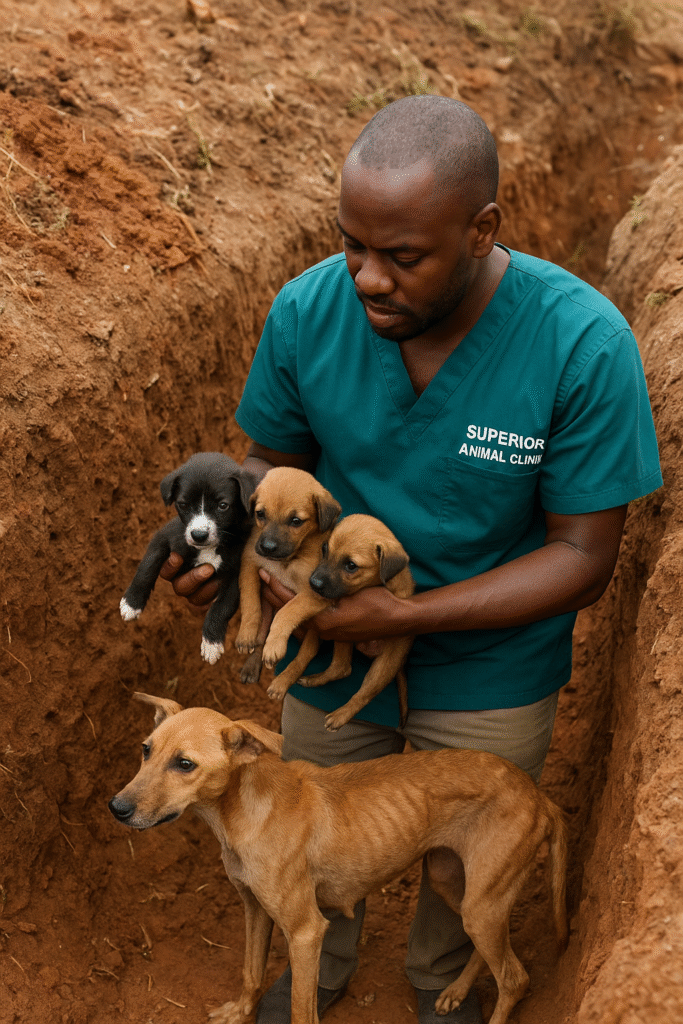
4. Aggression, Fear, and Safety Concerns
Not all free-roaming dogs are aggressive — most are simply scared. But fear and hunger can make even a gentle dog defensive. In densely populated areas like Kisenyi, Rubaga, or Nakawa, dog bites remain a major concern, especially for children walking to school or playing outside.
These incidents cause trauma, expensive hospital bills, and sometimes lifelong fear of animals. The sad truth is that many of these situations arise not because dogs are “bad,” but because they are unvaccinated, hungry, or mistreated.
When communities work together — through education, compassion, and regular vet care — aggression can be greatly reduced.
5. Environmental and Sanitation Challenges
Large groups of free-roaming dogs often tear into garbage bags in search of food, leaving litter scattered around roads and drainage channels. In neighborhoods like Katwe, Mutundwe, and Kasubi, this contributes to poor sanitation and attracts pests.
It’s a cycle that hurts both people and animals — and can be broken only through proper waste management and controlled pet ownership.
6. Emotional Trauma for Children and Families
For many children growing up in Kampala’s bustling neighborhoods like Kawempe, Katwe, Lugala, or Kyebando, daily encounters with stray dogs can be frightening.
A sudden bark or chase from a roaming dog can cause fear, anxiety, or even lifelong phobia of animals. Parents, too, live in constant worry about their children being bitten or scratched while playing outside.
These fears create invisible emotional scars — and they often lead families to see all dogs as dangerous. Yet the problem isn’t the dogs themselves; it’s the lack of control, vaccination, and care.
By promoting responsible ownership and community education, clinics like Superior Animal Clinic (0771909946) help families understand dogs better — turning fear into empathy and confidence.
💔 7. Animal Cruelty and Suffering
The harsh truth is that many free-roaming dogs in Uganda experience cruelty simply because they’re misunderstood.
In areas like Kasubi, Nateete, and Lukaya, hungry or sick dogs are often chased, stoned, or poisoned. Some people see them as pests instead of lost, frightened animals searching for food and kindness.
This suffering is preventable. With community outreach, spaying and vaccination drives, and humane rescue efforts, we can stop this cycle of pain.
Superior Animal Clinic actively supports compassionate animal care and encourages Kampala residents to report injured or abused dogs rather than harm them. A small act of compassion can change a dog’s life forever.
8. Economic Costs to Communities
The growing number of free-roaming dogs also comes with hidden costs.
- Local councils spend resources addressing bite incidents or removing dog carcasses from roads.
- Families pay for expensive rabies treatments after bites.
- Businesses, especially restaurants and markets in areas like Bugolobi, Kibuye, and Nansana, struggle to maintain hygiene when stray dogs scatter garbage or scare away customers.
Investing in community dog vaccination programs and public awareness campaigns through reputable clinics like Superior Animal Clinic in Makindye is far more affordable — and sustainable — than dealing with the aftereffects of neglect.
9. Wildlife and Environmental Impact
Few realize that free-roaming dogs also threaten Uganda’s local wildlife, especially in peri-urban and semi-rural areas around Wakiso, Ndejje, and Buziga.
These dogs sometimes chase or attack small wild animals like monkeys, birds, or even goats and sheep on nearby farms. Their waste also contaminates the environment, spreading parasites and bacteria that affect both wildlife and people.
Protecting wildlife begins right in our neighborhoods — by keeping our dogs vaccinated, contained, and cared for. Clinics such as Superior Animal Clinic (0771909946) work with responsible pet owners to ensure that dogs stay healthy and do not become a danger to the ecosystem.
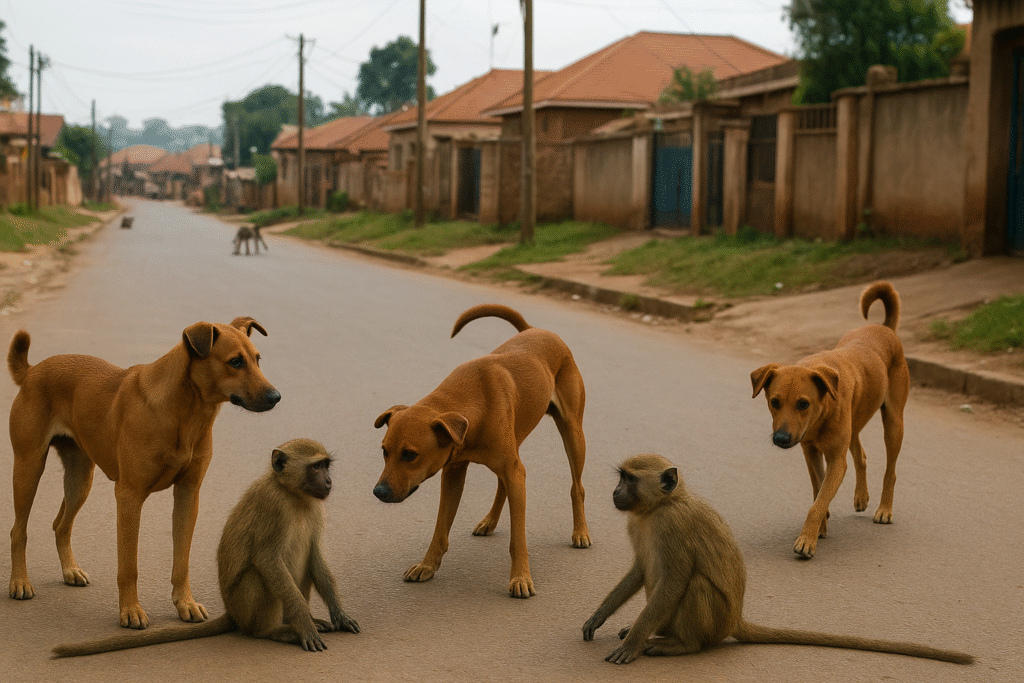
❤️ Protecting Our Communities Starts With Compassion
The risks of free-roaming dogs in Uganda aren’t just veterinary issues — they are human issues, touching on health, safety, and empathy.
By vaccinating, sterilizing, and keeping our dogs within safe homes, we can protect not only our pets but also our families, neighbors, and entire communities. Every responsible pet owner becomes part of the solution.
And when you need expert guidance, care, or emergency help, remember that Superior Animal Clinic (0771909946) in Makindye is always ready to serve pet owners from Nsambya, Zana, Rubaga, Ndejje, Muyenga, and all across Kampala.
Your compassion today could be the reason fewer dogs suffer tomorrow.
❤️ The Emotional and Community Impact
Free-roaming dogs are not villains — they’re victims of neglect, misinformation, and limited access to veterinary services. Many of them are gentle souls just looking for food, shelter, and kindness.
Communities that tolerate stray dogs without addressing the root problem often experience:
- Increased fear of bites or disease
- Unsanitary environments due to dog waste
- Sleepless nights from barking and territorial fights
- Children developing fear or trauma after dog encounters
But with awareness and community cooperation, this situation can change. Imagine a Kampala where every dog is vaccinated, safe, loved, and cared for — it starts with responsible ownership.
🐾 Responsible Dog Ownership: How You Can Help
Owning a dog in Kampala means more than feeding it leftovers and letting it roam. It’s a commitment of love, protection, and responsibility.
Here’s how to make a difference:
1. Keep Your Dog Secure
Provide a clean, safe space at home. Dogs should not be allowed to wander unsupervised — it’s dangerous for them and the community.
2. Vaccinate and Deworm Regularly
Rabies vaccines, deworming, and flea/tick prevention are essential for every dog.
You can get affordable vaccination packages at Superior Animal Clinic, serving areas like Makindye, Nsambya, Katwe, Rubaga, and Muyenga.
3. Spay or Neuter Your Pet
This prevents unwanted litters and helps reduce roaming tendencies in males. It also improves health and behavior. Contact Superior Animal Clinic (0771909946) to schedule a safe, professional procedure.
4. Provide Identification
Attach a collar with your phone number or consider pet microchipping — available at Superior Animal Clinic — to ensure your dog can be identified and returned if lost.
5. Adopt, Don’t Abandon
If you can no longer care for your pet, reach out to animal shelters or clinics for rehoming help instead of letting the dog loose. Abandonment contributes to Kampala’s growing stray dog crisis.
6. Educate Others
Share what you learn about responsible pet care with neighbors, boda riders, and friends. Awareness saves lives — both human and animal.
🐾 How to Control Free-Roaming Dogs in Kampala, Uganda
Solving the problem of free-roaming dogs in Kampala isn’t about chasing them away or hurting them — it’s about creating a balanced, compassionate system where both people and dogs can live safely together.
From the busy markets of Katwe, to the residential corners of Makindye, Muyenga, Rubaga, and Ntinda, the issue can be managed with practical, community-based actions that actually work in Uganda’s environment.
Here’s how we can make a real difference — together.
1. Vaccination Campaigns and Regular Vet Care
Vaccination is the first and most effective way to protect both dogs and people from deadly diseases like rabies, distemper, and parvovirus.
Most free-roaming dogs in Kampala are unvaccinated — not because owners don’t care, but often because of limited awareness or affordability.
✅ Solution: Organize community vaccination drives in partnership with local authorities and trusted veterinary clinics like Superior Animal Clinic (0771909946) in Makindye along Salaama Road.
These drives can be held in neighborhoods such as Nsambya, Ndejje, Zana, Lungujja, and Kasubi — bringing affordable, life-saving care closer to the people.
Every vaccinated dog reduces the spread of disease and brings Kampala one step closer to being a safer, rabies-free city.
2. Spaying and Neutering (Population Control)
One of the biggest reasons for Kampala’s growing stray dog population is uncontrolled breeding.
A single unspayed female can produce up to 20 puppies a year — many of which end up sick, homeless, or injured.
✅ Solution: Encourage and support spay and neuter programs across the city. Clinics like Superior Animal Clinic provide safe and affordable sterilization for both owned and rescued dogs.
By preventing unwanted litters, we reduce the number of dogs on the streets — humanely and effectively.
This simple action can save hundreds of dogs from a life of suffering and neglect.
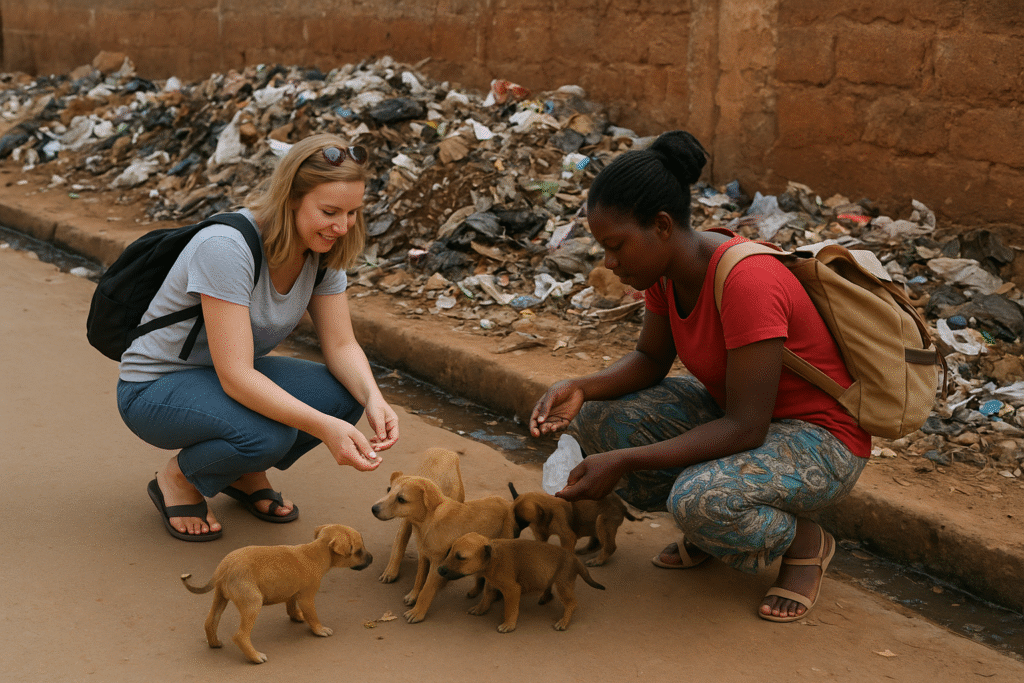
3. Promote Responsible Pet Ownership
In Uganda, many families allow their dogs to roam freely during the day because “they know their way home.” But while this may seem harmless, it exposes them to disease, accidents, and fights.
✅ Solution: Educate owners on responsible pet care — providing secure fencing, proper feeding, and leash walking instead of free roaming.
Pet owners should treat dogs not as guards only, but as living companions who depend on them for safety and well-being.
Clinics like Superior Animal Clinic in Makindye often hold community sensitization sessions to help owners understand what responsible ownership truly means.
🐾 4. Community Involvement and Local Council Participation
Real change happens when communities unite. Local Councils (LCs) can play a key role by coordinating with veterinary professionals, NGOs, and schools to spread awareness.
✅ Solution:
- Create neighborhood watch programs to monitor stray populations.
- Report injured or aggressive dogs to nearby vets instead of harming them.
- Organize joint clean-up and vaccination days to build stronger, safer neighborhoods.
When communities come together, kindness spreads faster than disease.
5. Rescue, Rehoming, and Adoption
Not every free-roaming dog is dangerous — many are friendly and simply lost or abandoned. Instead of ignoring them, we can give them a second chance.
✅ Solution:
- Encourage people to adopt rather than buy dogs.
- Work with animal-loving groups and clinics like Superior Animal Clinic that help in rescuing, treating, and rehoming stray dogs.
- Promote temporary fostering for puppies and abandoned pets.
Every adoption not only saves a life but also reduces the number of dogs struggling on Kampala’s streets.
6. Public Awareness and School Education
Children grow up learning from what they see around them. By teaching them compassion, safety, and pet care early on, we can shape a more humane generation.
✅ Solution:
- Integrate animal welfare topics into primary and secondary school programs.
- Invite veterinarians from Superior Animal Clinic to speak at community events and schools in areas like Rubaga, Muyenga, Ntinda, and Buziga.
- Use local radio and social media to share stories that inspire kindness instead of fear.
Education changes everything — it builds empathy and long-term awareness that transforms how we treat animals.
7. Proper Waste Management
Stray dogs are drawn to food waste left uncollected near markets, butcheries, and restaurants. This not only encourages more dogs to gather but also increases the spread of disease.
✅ Solution:
Local councils and residents can work together to:
- Use covered dustbins.
- Dispose of leftovers properly.
- Avoid feeding strays in open areas without a plan for vaccination or sterilization.
Cleaner streets mean healthier communities — and fewer dogs forced to scavenge for survival.
8. Government and NGO Collaboration
Lasting change requires strong partnerships between the public, government, veterinary clinics, and animal welfare organizations.
✅ Solution:
- The Kampala Capital City Authority (KCCA) can collaborate with clinics like Superior Animal Clinic to run mass vaccination and sterilization campaigns instead of harmful elimination methods.
- NGOs can sponsor mobile vet clinics in underserved areas like Ndejje, Seguku, or Nansana.
- Communities can be trained in humane dog handling and rescue practices.
These collaborations create sustainable systems where animals are protected, not punished.
🌟 A Humane Kampala Is Possible
The challenge of free-roaming dogs in Uganda isn’t impossible to solve — it just needs empathy, education, and teamwork.
Every vaccinated dog, every fenced home, every sterilization, and every adoption makes Kampala a cleaner, safer, kinder city.
If you live in Makindye, Nsambya, Muyenga, Katwe, Rubaga, Zana, or any nearby area, take the first step today.
📞 Call Superior Animal Clinic (0771909946) — your trusted veterinary partner for vaccination, spaying, emergency rescue, and community pet care.
Together, we can control the problem of free-roaming dogs — not through fear or cruelty, but through compassion and responsible action.
🌍 Community Solutions for Kampala
To solve the free-roaming dog challenge, we need collective effort:
- Local councils (LCs) can partner with veterinary clinics like Superior Animal Clinic for vaccination drives.
- Schools can teach children compassion and animal care.
- Residents can form neighborhood watch groups for stray reporting and rescue.
- Government agencies can support community sterilization programs instead of relying on harmful or outdated control methods.
When everyone participates, Kampala can become a model city for humane dog population management in East Africa.
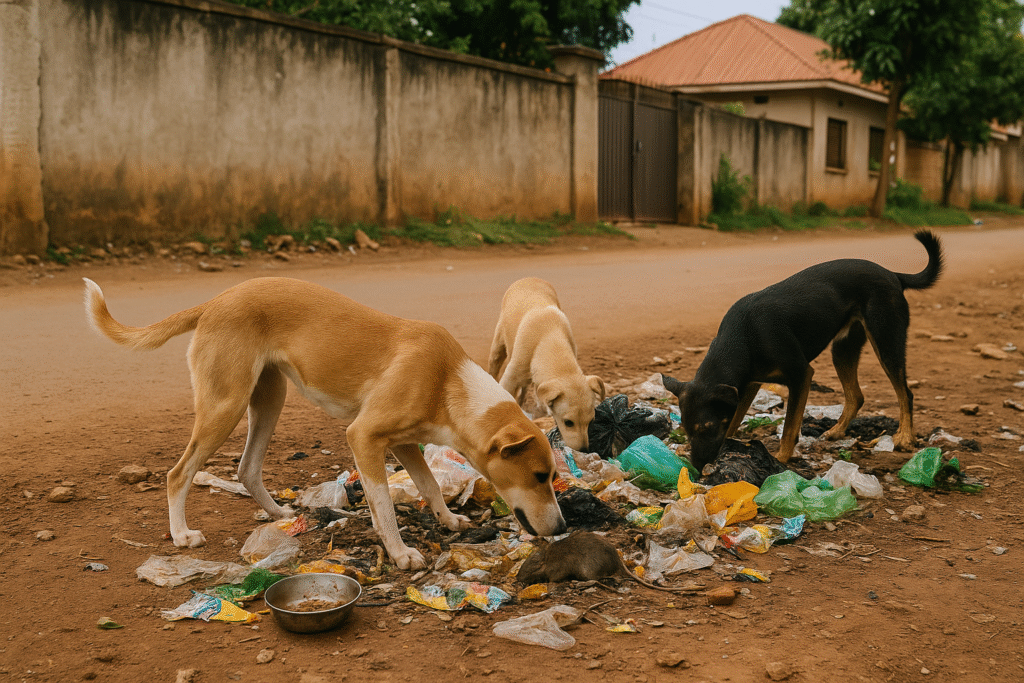
Where to Get Help: Superior Animal Clinic
If you spot a sick, injured, or aggressive roaming dog in Makindye, Nsambya, Zana, Rubaga, or nearby areas, contact Superior Animal Clinic immediately.
They specialize in:
- Dog vaccination and parasite control
- Emergency treatment for injured dogs
- Spaying and neutering
- Rabies awareness and prevention
- Pet rescue and rehoming guidance
📞 Call or WhatsApp: 0771909946
📍 Located in Makindye along Salaama Road, Kampala
Their compassionate team understands both the medical and emotional side of animal care — treating every dog like family.
🐾 FAQs About Free-Roaming Dogs in Kampala, Uganda
🐕 1. Who is responsible for free-roaming dogs in Kampala?
In Kampala, responsibility for managing free-roaming dogs is shared between pet owners, local councils (LCs), and veterinary authorities.
Pet owners are required to keep their dogs vaccinated, sterilized, and within safe enclosures. Local authorities such as KCCA (Kampala Capital City Authority) work with veterinary clinics like Superior Animal Clinic in Makindye (0771909946) to organize community vaccination drives and humane dog population control programs.
Every resident also plays a part — by reporting sick, injured, or aggressive dogs to professional vets instead of harming them.
2. Who is the best vet for dogs in Kitante, Kampala?
If you’re in Kitante, Kololo, or nearby areas and searching for the best vet for dogs, the highly recommended choice is Superior Animal Clinic, located in Makindye along Salaama Road.
They provide professional veterinary care including dog vaccinations, deworming, emergency treatments, spaying and neutering, parasite control, and general health check-ups.
Pet owners across Kampala — from Kitante to Ntinda, Bugolobi, Muyenga, and Rubaga — trust Superior Animal Clinic (Call 0771909946) for compassionate, reliable, and affordable dog care services.
🦠 3. What are the dangers of free-roaming dogs in Kampala?
Free-roaming dogs can spread diseases such as rabies, parvovirus, and mange, cause road accidents, and sometimes frighten or bite people, especially children.
They also contribute to poor sanitation when scavenging through waste.
You can help reduce these risks by vaccinating, sterilizing, and properly containing your dog. For expert help, visit Superior Animal Clinic, which offers full preventive care and public awareness campaigns across Kampala.
4. How can we control the stray dog population in Uganda?
The most humane and effective way to control stray dogs in Uganda is through mass vaccination, spaying and neutering programs, and community education.
Clinics like Superior Animal Clinic in Makindye partner with pet owners and local authorities to organize low-cost sterilization drives in areas such as Zana, Nsambya, Rubaga, Muyenga, and Ndejje.
When every dog owner takes responsibility, the number of stray dogs on Kampala’s streets drops dramatically.
5. What should I do if I find a stray or injured dog in Kampala?
If you see a lost, sick, or injured dog, avoid approaching it directly if it looks scared or aggressive. Instead, contact a professional vet immediately.
📞 Call Superior Animal Clinic at 0771909946 — they offer safe animal handling, emergency care, and guidance on what to do next.
You can also provide clean water or food nearby while waiting for help, but never try to force the dog into your home or vehicle without proper equipment.
6. How often should dogs in Kampala be vaccinated and dewormed?
Dogs should be vaccinated against rabies once a year, and dewormed every three months.
If your dog interacts with other animals or roams outdoors, additional vaccines (for parvovirus, distemper, and leptospirosis) are highly recommended.
You can get an affordable vaccination and deworming plan at Superior Animal Clinic, serving all major areas of Kampala — including Makindye, Nsambya, Muyenga, Kitante, and Rubaga.
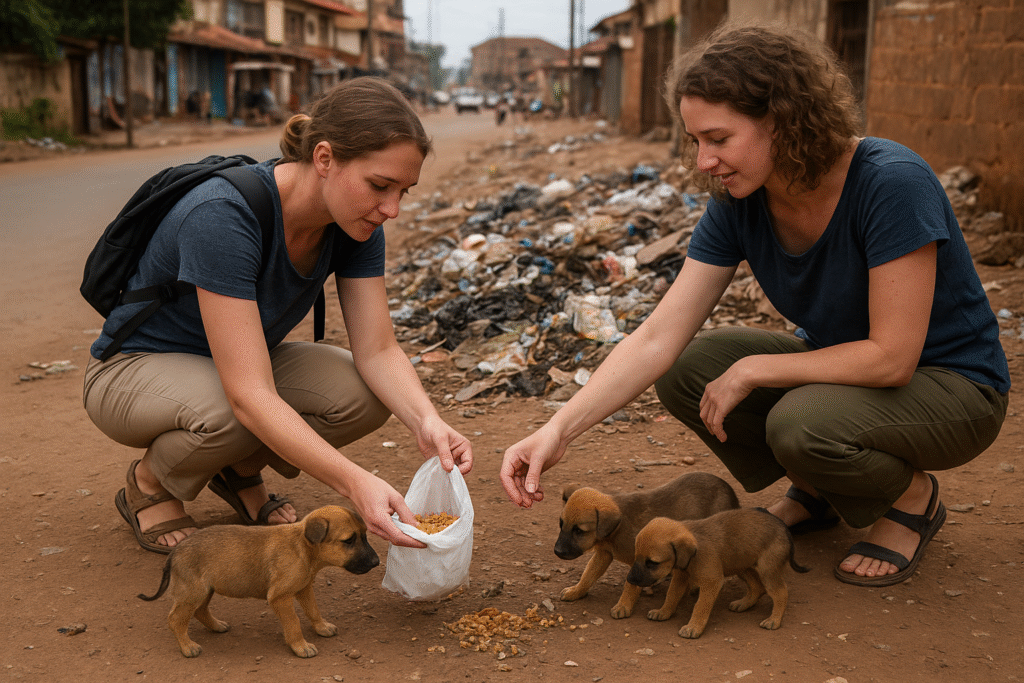
🐾 7. Who can I call about stray dogs in my neighborhood?
If you’re in Makindye, Katwe, Rubaga, Ndejje, or any nearby Kampala area and notice stray dogs, you can call Superior Animal Clinic at 0771909946 for professional help.
They provide safe rescue assistance, vaccination, and community awareness programs. You can also inform your local LC official or veterinary department for coordinated action.
8. Why do so many dogs roam freely in Kampala?
Many dogs roam freely in Kampala because their owners allow them to wander, believing they’ll return home. Others are abandoned, lost, or born on the streets.
The lack of public education about responsible pet ownership and limited access to affordable sterilization services makes the problem worse.
Clinics like Superior Animal Clinic are helping change this by offering low-cost spaying, neutering, and public education to reduce the number of stray dogs in Kampala humanely.
9. How can I help stray dogs in my community?
You can help by supporting local vaccination and rescue campaigns, adopting or fostering stray dogs, and educating others about responsible pet ownership.
Even small acts — like donating to animal care initiatives or reporting injured dogs — make a huge difference.
Partner with compassionate clinics like Superior Animal Clinic in Makindye (0771909946) to learn how you can get involved and help build a safer, kinder Kampala.
10. What should I teach my children about stray dogs?
Teach your children to stay calm and avoid running when they see stray dogs. They should never throw stones, shout, or tease them.
Encourage them to respect animals and tell an adult if they notice an injured or aggressive dog nearby.
You can also bring your family to Superior Animal Clinic, where vets often guide parents and children on dog safety and compassionate behavior.
🌟 Final Thoughts
Free-roaming dogs in Kampala are not just a “street problem” — they’re a shared community responsibility. Each of us has a role to play in creating a safer, healthier, and more compassionate city.
When we vaccinate, sterilize, and protect our pets, we not only save their lives — we also protect our children, our neighbors, and our community’s well-being.
So, the next time you see a stray dog wandering your street, don’t turn away. Be the person who cares, educates, and acts.
And when you need expert help, guidance, or treatment, Superior Animal Clinic (0771909946) is always ready to support you and your furry friends.
